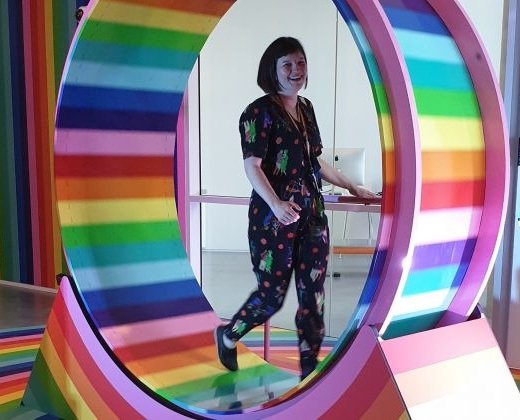Dr Emma Burrows, Head of the Translational Behaviour Laboratory at the Florey Institute, partnered with renowned Japanese Australian artist Hiromi Tango to create an interactive ‘living lab’ artwork that explores how fun, laughter and play can encourage the levels of physical activity needed to boost our mood and protect our mental health.
Research demonstrates that regular exercise offers a range of benefits, with 30 minutes of daily exercise shown to improve cerebrovascular health, cognitive function and protect our mental health.
“Through my work, I’ve seen the positive effects that exercise can play in boosting brain plasticity, mood and memory. What Wheel aims to illustrate is that exercise doesn’t have to be a gruelling task – we can all find different and novel ways to exercise that are joyful,” said Dr Emma Burrows.
The two creators were inspired by the notion that when exercise is fun it’s easier to commit to.
“The laughter of people using Wheel is infectious,” said Dr Burrows. “I like to think of exercise as mood medicine”.
The exhibit harnesses a concept known as ‘citizen science’ where members of the public engage at their own pace with a rainbow human-sized hamster wheel or a handwheel that are enriched with sensors to measure activity.

Dr Burrows aims to use the exhibit as a living lab model to collect data on participant exercise as well as information about mood before and after using Wheel.
“We know that exercising regularly impacts our mental health but maintaining this isn’t always easy, especially during a pandemic. Hiromi and I hope that Wheel can shed light on the ingredients that may help us to maintain regular activity over time to build a brain reserve that protects us throughout life.”
How you can improve your mental health through exercise
Regular physical activity facilitates the release of hormones and endorphins in the brain that can have a range of mental health benefits.
- Aim for at least 30 minutes of physical activity every day to lower stress and promote a better sleep cycle.
- View everyday activities as a good opportunity to be active, for example, taking the stairs, walking the dog or playing with your children.
- Consider including another person, a good podcast, or new locations where possible in your exercise to make it enjoyable and help with motivation.
Now showing at Science Gallery Melbourne, come take part in this citizen science approach to research, visit Science Gallery Melbourne for more information.